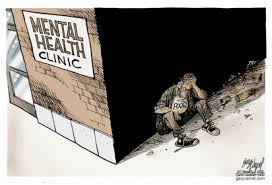
The Connection Between Mental Illness and Homlessness

The Soloist direct by Joe Wright is the film adaptation of the true story written by Steve Lopez. Lopez is a journalist who writes a column for the Los Angles Times. One day he found Nathanial Ayers, a Julliard drop out who is homeless and suffering from schizophrenia. In the film there appears to be a strong correlation between mental health and homelessness. There were scenes in a homeless shelter that showed that plenty of the residents did not look all there mentally. This made me wonder what are the actual numbers of those who are homeless with a mental disorder and vice versa. And if the numbers are high enough, should the government provide housing and treatment for these individuals? Also, what treatments should be used? In the film when Ayers plays his cello, his symptoms seems to slip away for a while and he almost seems to be more connected with himself. Does music really help those with mental disorders, especially those with schizophrenia?
King and Thoreau’s Call for Change
Both King and Thoreau are dissatisfied with government in their times. They feel that their current governments cannot severe the people hoe they want to be served. They also share the view that when a law is unjust, one is obligated to break it. Thoreau believes that the individual should have more power than the government and he hopes for a future with minimal government power. King hopes for a future where the government can allow for all men to be treated as equals, regardless of their race and skin color. King hopes for the government to step in and grant justice where justice is needed. Though King and Thoreau have different ideas for what the government needs to do, they both realize that the current government of their times need change and people must call for this chan
Satire as an Effective Argument

Satire when used correctly can be a very effective form of argument. Harry Golden uses quite a bit of satire in his essay, yet he had enough ethical appeal in his argument to make it convincing. He proposes a few silly plans of desegregation such as his “Vertical Negro Plan” and his “White Baby Plan”. Both of the plans are not very practical. For example, with his “White Baby Plan”, he proposed that anytime a Negro wanted to go to the movies, all they had to do was go pick up a while child from a working mother and go. Eventually they could make factories to mass produce white baby dolls. Golden does propose a solution that isn’t completely absurd and uses some logic. Just say the whit water fountains are out of order. The whites will start using the color fountains and eventually all fountains would be desegregated.
On the other hand, Roger Guffey in his essay “Left Handers (Those sickos) Got No Reason to Live!” just spews emotional language with no real ethical appeal. He name calls and pokes at left handers without providing his reasons why. I was able to gather that he is trying to compare being left handed to being gay by the history footnote provided, but his actually essay does not convey this. Had he used a bit more ethical appeal, his essay would have been more more effective.
Mental Illness and Homelessness

Mental illness is a tricky subject. It always has been. People used to think that mental illness were caused by supernatural forces, like demons. For most of history, we did not know how to treat such illnesses. Some believed religious rituals were the answer. Some believed that there was no hope and people suffering from mental illnesses should be locked up and separated from society. Even with today’s advance with medicine, people are still unsure of how to treat people with mental illnesses. It is still a social stigma. Unfortunately, many people who have a mental illness end up homeless. The Soloist is about a former Juilliard student, Nathaniel Ayers, a homeless schizophrenic who spends is time playing a violin with two strings. Journalist Steve Lopez discovers him and starts to write about him and learn about his history. Lopez tries to help Ayers with great difficulty.
There are multiple issues with this movie that grab my attention. What first got my attention was that even though Ayers was in a grim situation, he had music to find comfort in. Another issue that drew me in was mental illness. I have seen what mental illness can do to people. Alzheimer’s runs in my family. I watched my grandmother slowly fall to the disease. It is one thing that I want no person to have to go through. to have their body be physically there but have their mind deteriorate. Watching how Ayers failed out of Juilliard because of his schizophrenia was hard to watch.
What I know about mental illness is that it is stigmatized. People do not like to associate with those who have a mental illness. Also many mental illnesses are not curable. Many can only be treated to help reduce the symptoms. I have noticed in a few different cases that music, especially playing music, can help relieve some of the effects of mental disorders. In the movie, Ayers seems to be better the more his is around and the more he plays music. I have also seen cases where people who suffer from dementia can play a piece that they have learned decades ago even though they cannot remember what they ate for breakfast that morning.
What I do want to learn is how many people who are homeless have mental disorders and how many people who have mental disorders are homeless. I know there is some sort of a correlation but I want to know the numbers. Also I want to know the validity of how music can help those who suffering from mental illnesses.
Building of a Rebuttal Argument: “A” is for “Absent” by Chris Piper
 For my rebuttal argument, I will be arguing against Chris Piper’s “A” is for “Absent”. I will be opposing his views on required attendance that some college professors enact.
For my rebuttal argument, I will be arguing against Chris Piper’s “A” is for “Absent”. I will be opposing his views on required attendance that some college professors enact.
Piper believes that professors should not be able to grade upon attendance. His main point of reasoning is that if a student pays for a class, the student should have the free choice of attendance without consequence. He also argues that if a student can achieve high test scores, there is no need for the student to attend class. These are some valid point brought up by Piper that provide for a decent argument.
There was an assumption that Piper made that I did not agree with. He stated, “I imagine a few instructors adopt attendance policies to stroke their own egos-to ensure a crowd is present when they enlighten the eager masses.” As an aspiring educator, I am sure that most instructors who implement an attendance policy are not simply doing it as an ego boost, but are doing it to help the students. Think about it like this; there was always something that your parents always told you or made you do when you were growing up that you absolutely hated. Almost everybody hated cleaning their room as a kid, yet learning how to be organized and clean is an important life skill to have. The same can be applied to required attendance implemented by instructors.
Analysis of My Argument Style
As most of you know, there are two types of argument styles that we have talked about. These types of arguments are traditional and consensual arguments. Traditional argument is the type of argument that you would expect to see in the court room. Most of the time there is a winner and there is a loser, clear cut. Consensual argument is more focused on finding an agreement between parties. Negotiation and mediation are two good examples of this type of argument. Most people tend to argue in one style better than the other. I have found that I argue better with a consensual style. I often find myself acting as a mediator in most situations
The last time I found myself in an argument was at work on Tuesday evening. My co-worker and I were arguing about theories of a character’s origin in the recently released film Star Wars: The Force Awakens. For those of you that have not seen it, I will try to keep this spoiler free. Anyways, what we were trying to do was convince each other that we knew the origin of a character based upon clues seen throughout the movie. We both presented our own theories and evidence to support our claims. This argument was an everyday argument. The argument itself ended in a stalemate. We both acknowledged each other’s theories but did not convince each other to switch sides on our arguments.
This was not my usual preferred method of argument. My usual goal when I argue is to come away from the argument with a change of view from at least one of the parties, whether if it be by completely agreeing with another party or through mediation. After the argument we had, we both left the argument the way we entered. There wasn’t any sort of progress made view wise. Sure, we both now have each other’s view to think about, but we both still firmly believe in our own views.
I think one thing that really influenced my argument style was the people that I associated with growing up. I have had many friends in the past who have disagreed with each other on different issues. When this would happen, I would often find myself mediating the situation so that everybody could come out happy. Another influence on my argument style is the fact that I am the youngest of two children. A lot of the time I did not get things, “my way”. Instead of fighting to get things how I wanted them, I would try to find a middle point in whatever argument that we were having so that we could both be satisfied.
I really enjoy my current style of argument because I find it as one of the best ways to be productive in an argument. A good amount of the time people will go into an argument very headstrong in their ideas and unwilling to budge. Sometimes in order to make progress, you must be willing to swallow your pride and try to reach a compromise. But of course, this argument style cannot work in every single argument. Because of this, I would like to get better at traditional style arguments so that I can become more of a well rounded arguer.
